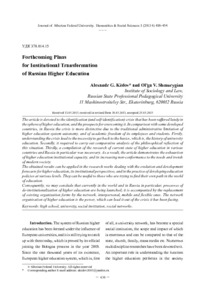Перспектива институциональной трансформации российской высшей школы
Скачать файл:
URI (для ссылок/цитирований):
https://elib.sfu-kras.ru/handle/2311/9633Автор:
Kislov, Alexandr G.
Кислов, А.Г.
Shmurygina, Ol’ga V.
Шмурыгина, О.В.
Дата:
2013-03Аннотация:
The article is devoted to the identification (and self-identification) crisis that has been suffered lately in the sphere of higher education, and the prospects for overcoming it. In comparison with some developed countries, in Russia the crisis is more distinctive due to the traditional administrative limitation of higher education system autonomy, and of academic freedom of its employees and students. Firstly, understanding the crisis lead to the necessity to get back to the basics, which is, the history of university education. Secondly, it required to carry out comparative analysis of the philosophical reflection of this situation. Thirdly, a compilation of the research of current state of higher education in various countries and Russia in particular was necessary. As a result, the article demonstrates the exhaustion of higher education institutional capacity, and its increasing non-conformance to the needs and trends of modern society. The obtained results can be applied in the research works dealing with the evolution and development forecasts for higher education, its institutional perspectives, and in the practice of developing education policies at various levels. They can be useful to those who are trying to find their own path in the world of education . Consequently, we may conclude that currently in the world and in Russia in particular, processes o f de-institutionalization of higher education are being launched; it is accompanied by the replacement of existing organization forms by the network, interpersonal, mobile and flexible ones. The network organisation of higher education is the power, which can lead it out of the crisis it has been facing. Статья посвящена идентификации (и самоидентификации) кризиса, который возник в последнее время в сфере высшего образования, и перспективам его преодоления. По сравнению с некоторыми развитыми странами в России кризис более значителен из-за традиционных административных ограничений высшей автономии системы образования и академической свободы сотрудников и студентов. Во-первых, понимание кризиса приводит к необходимости вернуться к основам университетского образования. Во-вторых, следует провести сравнительный анализ философской рефлексии этой ситуации. В-третьих, исследование текущего состояния высшего образования в различных странах и России, в частности, было необходимо. В результате статья демонстрирует истощение институционального потенциала и увеличение его несоответствия потребностям и тенденциям современного общества. Полученные результаты могут быть использованы в исследовательских работах, связанных с эволюцией и прогнозами развития высшего образования, его институциональной точкой зрения, а также в практике разработки политики в области образования на различных уровнях. Они могут быть полезны для тех, кто пытается найти собственный путь в мире образования. Следовательно, мы можем заключить, что в настоящее время в мире и в России, в частности, процесс деинституционализации высшего образования запущен, он сопровождается заменой существующих форм организацией в сети, межличностной, мобильной и гибкой. Сеть организации высшего образования есть сила, которая может вывести его из кризиса.

